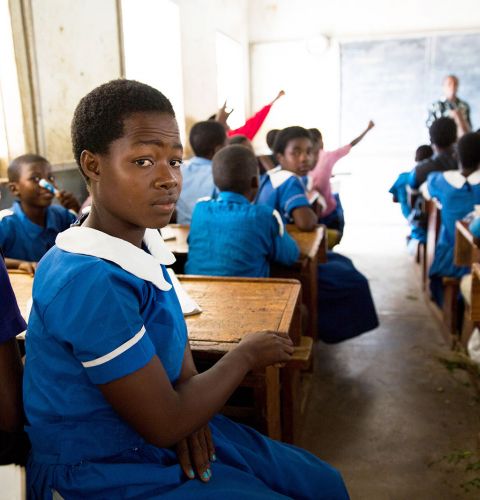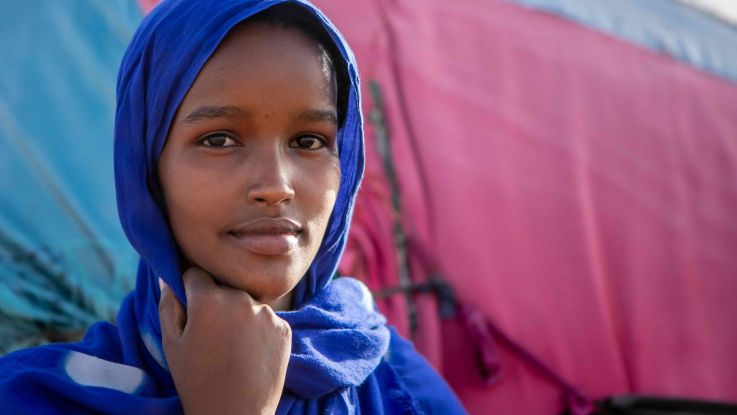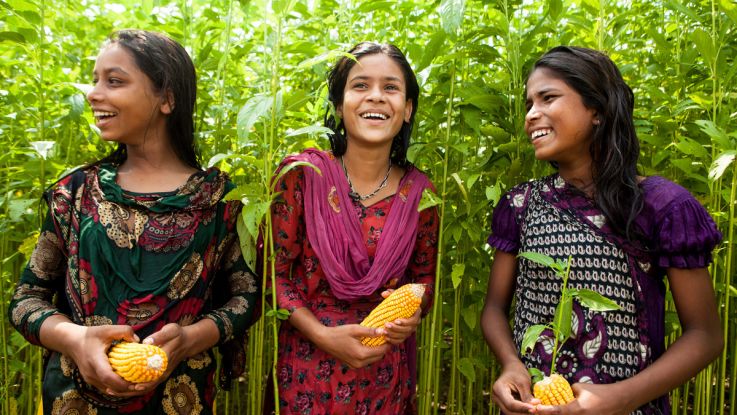
Period poverty - FAQs
Periods and menstrual health are a key part of life and sexual and reproductive health. But they can be challenging for women, girls and people who menstruate around the world.
During and because of menstruation, many have to bear the potential harm to their health from lack of access to menstrual products.
They may have to deal with secrecy, taboos and discriminatory practices against them. And most importantly, many suffer the short and long-term effects on their education, working ability and participation in life's activities.
This is why periods and menstrual health are an important focus for ActionAid. We work closely with women, girls and people who menstruate to ensure all can enjoy their full sexual and reproductive rights.
Our supporters ask us important questions about our approach and how we work to help people manage their periods with dignity.
Read on for a list of frequently asked questions and answers about periods and our work.
Questions about periods
What is a period or a menstruation?
Periods, or menstruation, is the regular release of blood and tissue from the uterus through the vagina.
What is menstrual health and why is it important?
Menstrual health or menstrual health management refers to the use of menstrual products to collect menstrual blood, and access to private facilities to change and dispose of used products.
Menstrual health is important to prevent infection and to enable women, girls and people who menstruate to lead healthy and productive lives.
Questions about period poverty
What is the definition of period poverty?
Period poverty is the lack of access to resources like menstrual products, washing facilities and private spaces to manage menstrual health. Period poverty also includes the restrictions placed on people due to the shame and cultural taboos surrounding menstruation.
Both the shortage of resources and the shame attached to menstruation can further affect people's lives, for example by impeding their education or ability to work. Find out more about period poverty.
How much can periods possibly cost?
Periods can be expensive. It is estimated that the average lifetime cost of having a period is £4,490 in the UK1 . This includes menstrual products, underwear, and pain relief.
In Malawi, a pack of sanitary pads costs more than a whole day’s pay. Since most women, girls and people who menstruate need at least two packs per period, this could mean spending two days’ pay every month on menstrual products2 . In Kenya, a pack of eight pads costs about one US dollar, but half of the population lives on less than a dollar a day.
It's not just about money: in some places there are simply no tampons or pads available in local shops or communities, either due to cultural stigma or practicalities of manufacturing and shipping.
How do periods affect education?
Period poverty and stigma can have a negative impact on girls' education and further opportunities in life. In the UK and around the world, some girls who have limited or no access to menstrual products skip school every month due to fear of staining and discomfort.
Many also don't have access to safe and clean toilets to change their menstrual products or wash their hands.
One in 10 girls in Africa miss school because they don’t have access to menstrual products, or because there are no safe, private toilets to use at school. Many girls miss up to 50 days of school or work every year because of period poverty and stigma.3
Find out more about how period poverty affects girls' education and empowerment.
What is the relationship between periods and violence?
We know many girls around the world miss out on school due to their period. And in the long term, skipping valuable days at school could mean a girl does not finish her education.
Little or no education can have a devastating impact on a girl's life. It could mean she is more likely to be forced into child marriage4 , more likely to get pregnant at a young age5 and is more vulnerable to violence and abuse.6
Girls who have no education are more likely to marry by the time they turn 18, compared to girls with secondary education.7
And girls who have been married as a child to older partners are more susceptible to violence due to social isolation and a lack of independent resources.
Read more about the link between period poverty and violence.
How does ActionAid work to end period poverty?
ActionAid provides training in how to make reusable sanitary pads, so they always have access to clean and affordable menstrual protection.
We provide information about periods, sex and pregnancy in our girls' clubs and safe spaces in schools. And we are working in countries like Nepal to put an end to period-shaming practices like Chhaupadi.
Lastly, in humanitarian emergencies we distribute kits containing sanitary pads, soap and underwear to help people manage their periods safely.
Why not put poor people on birth control like the contraceptive pill?
Women and girls all over the world have right to their own bodily autonomy and should be able to make choices about what happens to their bodies.
And ActionAid supports women and girls around the world to claim their full range of sexual and reproductive rights.
We never enforce decisions about women's and girls' bodies on them. We challenge practices that deny them control over their own bodies and ensure they have a spectrum of options available to them. Find out why menstrual health is a right and not a privilege.
How are we helping those suffering from period poverty in the UK?
We absolutely recognise that there are many people in need of support in the UK and there are some fantastic charities who help them.
However, ActionAid has always been an international development agency with a main focus on working with women and girls in the global south who are living on the margins of survival.
We reach over 15 million people in Africa, Asia and the Americas every year.
Find out more about what we do, where we work and who we support.
Questions about periods in humanitarian emergencies
Why are sanitary pads important in humanitarian disasters?
Periods don't stop when conflict erupts or disaster strikes.
During a crisis, menstruation continues, and women, girls and people who menstruate need clean and safe products to manage their periods with dignity.
In humanitarian emergencies, people are often forced to leave their homes and all their belongings behind. In refugee camps and elsewhere, there can be no guarantee of menstrual protection, because of a lack of access to menstrual products or the scarcity of money to buy them.
We know menstrual products are an essential item in humanitarian crises, because women living through these crises tell us they are among the items they need most.
Find out more about periods in humanitarian disasters.
What do people in crises use when they don’t have menstrual products?
During humanitarian disasters, women, girls and people who menstruate are often forced to use whatever they can to manage their periods, including rags, newspapers and even tree bark.
For those who can't access sufficient menstrual products, many have no choice but to re-use a single pad for many days.
This can be psychologically distressing, uncomfortable and even dangerous, putting them at serious risk of infection.
Questions about period shaming, stigma and taboos
What are menstruation taboos?
Menstruation taboos are religious or culture-based restrictions or prohibitions placed on women, girls and people who menstruate during their periods.
In some cultures people are not allowed to enter places of worship, bathe, cook, eat certain foods or take part in their usual day-to-day activities when menstruating.
Some of these taboos arise from the perception of menstruation being unclean or shameful.
What are some euphemisms used for periods around the world?
There are over 5,000 euphemisms or slang terms in 10 different languages to describe periods.
From the commonly used 'Aunt Flow' and 'Time of the month' to 'Strawberry Week' in Germany, 'Granny's stuck in traffic' in South Africa, 'Mad cow disease' in Finland and 'Shark Week' in USA8 , using slang terms or euphemisms to describe periods promotes or exacerbates the stigma and secrecy surrounding periods.
Instead, we celebrate periods openly and mark Menstrual Hygiene Day every year.
How is ActionAid helping to end period shame and stigma?
ActionAid works with communities around the world to end shaming practices that relegate menstruating people to the margins of society.
Although illegal in Nepal since 2005, Chhaupadi - a practice that banishes people to huts when menstruating, under the belief that they will bring bad luck - is still practised in some communities.
These huts can pose several risks to those living in them, including risk of fire, animal attacks and suffocation. Sometimes young girls are left alone with no menstrual products or supplies.
ActionAid has set up women's groups in Nepal where local women can meet and reflect about the issue and come up with solutions to the problem. These 'reflect circles' empower women with knowledge and confidence, so they can question dangerous practices and overcome family resistance.
Since our work began in Nepal, more than 1,400 women have stopped practising chhaupadi. ActionAid has worked closely with local partners to establish 11 ‘chhaupadi-free’ communities, helping change beliefs around menstruation.
Find out more about Chhaupadi and the fearless women who are tackling the practice.
Questions about periods, sustainability and the environment
Why is ActionAid not promoting the use of reusable sanitary pads?
We are! ActionAid provides sewing machines and provides training in how to make reusable sanitary pads in several communities around the world.
This ensures people have safe and hygienic products to manage their periods at low costs. For some, this also provides supplemental income and helps girls in the community who receive the pads for free.
Find out more about our work promoting reusable sanitary pads.
Why can't we just give the girls menstrual cups or period pants?
Menstrual cups are part of a long-term, sustainable solution to period poverty.
ActionAid has set up a project in Malawi that distributes menstrual cups to those who can't afford sanitary pads. Menstrual cups last for 10 years and are better for the environment, but we know that this option is not suitable for everyone.
We work closely with communities and put the voices of local people front-and-centre, to increase their access to menstrual products and give them a choice in how to manage their menstrual health.
From our discussions with the women and girls we work with, we know that menstrual cups are not understood or not considered culturally appropriate in some communities.
Menstrual cups need to be inserted into the body and are regarded with suspicion for this reason. It is possible that this solution could lead to cultural stigma, stress and further complications, for example if a woman or girl has been subject to FGM.
Period pants are also not widely available in the communities where we work. Where period pants are available, the cost can be high and we consider whether people have access to facilities to wash the pants regularly - especially during a humanitarian crisis.
However, we constantly review this to ensure we provide the right products for the people we support, taking cost and location into consideration.
How do periods affect the environment?
Disposable menstrual products, particularly mass-produced sanitary pads, are mostly made from plastic and other non-biodegradable materials that harm the environment.
Pads can be up to 90% plastic, while tampons contain at least 6% plastic9 . Plastic production at large scale releases huge amounts of greenhouse gases, which cause air pollution and global warming.
Furthermore the discarding of menstrual products, for example by swaddling them in plastic shopping bags, fills up landfills as plastic takes years to biodegrade.
Flushing menstrual products down the toilet also means these products can end up in the ocean and wash up on our shores. Hundreds of species could get caught in or end up eating parts of these products.
That's why ActionAid provides training in how to make reusable sanitary pads, so people can have access to safe menstrual protection at their fingertips. We provide communities with sewing machines, and run projects in schools where we distribute reusable pads to school girls for free.
Find out more about how period products have an impact on the environment.
Why can't I donate menstrual products?
ActionAid always aims to source menstrual products as locally as possible.
Sourcing goods in this way helps us to cut down on costs, while ensuring the items we provide are appropriate for the local environment and culture.
This not only supports the local and national economy, but it facilitates a more efficient response, as it means we don’t have to depend on regional postal systems.
In non-emergencies, we also work with communities on a case-by-case basis to determine the best solution for women, girls and people who menstruate within that community.
Sometimes that means providing disposable sanitary pads; other times it may mean providing communities with the tools to create their own reusable sanitary pads, and the training to be able to use them safely.
How can I help people in the global south manage their periods?
Footnotes
- 1https://www.stevenage.gov.uk/waste-and-recycling/reusable-period-products-scheme
- 2https://www.joghr.org/article/32436-period-poverty-why-it-should-be-everybody-s-business
- 3https://blogs.worldbank.org/en/education/menstrual-health-and-hygiene-what-role-can-schools-play
- 4https://www.girlsnotbrides.org/learning-resources/child-marriage-and-education/common-drivers-of-child-marriage-and-a-lack-of-quality-education-for-girls/
- 5https://plan-international.org/srhr/teenage-pregnancy/
- 6https://blogs.worldbank.org/en/education/girls-education-conflict-most-risk-heres-how-reach-them
- 7https://www.girlsnotbrides.org/learning-resources/child-marriage-and-education/
- 8https://mashable.com/article/words-for-periods
- 9https://plasticfree.org.uk/2024/10/02/seeing-red-on-period-plastic/
Page updated 22 January 2025


